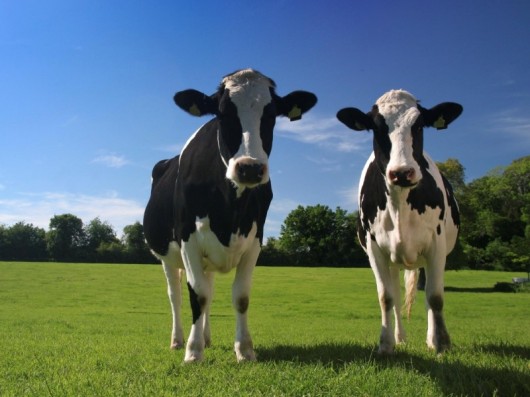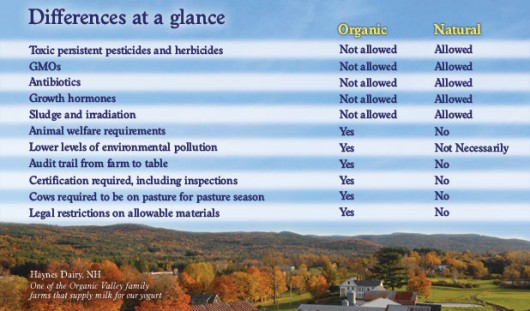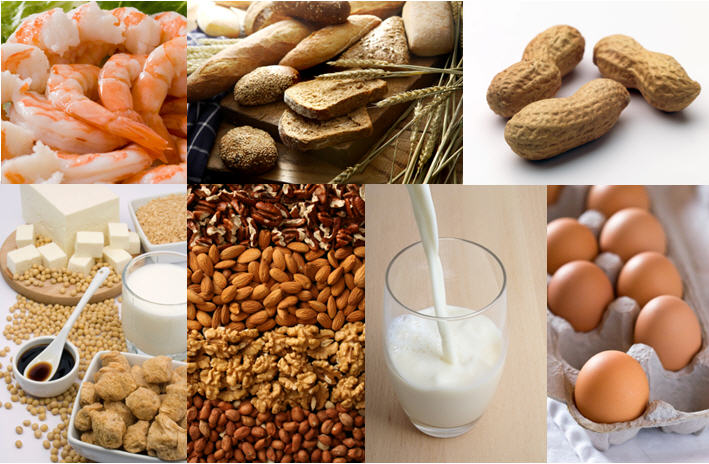This is an easy one. YES!
I can think of about 25 reasons why organic dairy is worth the slightly higher cost, but I’ll keep this list short and just mention a few of the most important ones.
1. No artificial growth hormones (rBGH). On many conventional dairy farms, cows are given artificial hormones to speed their growth and increase milk production. This can easily lead to udder infections (mastitis) which are extremely painful for the cows and require more antibiotic use – so more antibiotics (as well as other gross infection-related byproducts) end up in your milk.
2. No toxic pesticides. Organic farming regulations prohibit the use of toxic pesticides which have been proven to cause cancer, reproductive and hormone dysfunction, nervous system and lung damage, and an increased risk of ADHD in children. Dairy products from conventionally raised cows contain pesticides that were used in animal feed.
3. More humane treatment of cows. Organic standards require that cows spend at least 120 days per year grazing on pasture. Some organic dairy farms keep their cows out on pasture even more than that, weather-permitting, so they’re grass-fed instead of corn/grain-fed (not a natural diet for cows). Sadly, most cows on big conventional farms spend their entire lives standing in small cages indoors on cement floors; these unnatural conditions and close quarters breed more disease and a very poor quality of life for the cows.
4. It’s more nutritious. Research has shown that milk from pasture-raised cows is higher in Omega-3 fatty acids and lower in saturated fat, which makes it more heart-healthy. So in addition to being free of toxic pesticides, genetically modified organisms, and artificial growth hormones, organic milk is truly more nutritious on an elemental level.
5. Supports small family farms. More and more, food in America is controlled by a few big agribusinesses who have historically valued profit over human health, environment, humane treatment of animals, and fair wages for farm workers. Buying organic food is one way to show your support for a fairer, more sustainable agricultural system that keeps small family farms in business.








4 Comments
Teri Roughen
May 20, 2012 at 11:56 amAmelia-
That makes a lot of sense. I will switch over! Although I’ve stopped having milk and switched to soy, my husband still has it in cereal. Thanks again. Teri
shelley
May 20, 2012 at 10:42 pmThank you so much, Meels! I’m forwarding this to some key peeps who still need some convincing! When I found out that 40% of the WORLD’S antibiotics are used on the U.S.’s beef and dairy cows, that’s all I needed to know!
Leea
February 1, 2013 at 2:56 pmThank you for your article. I think it is really important to look at what we are comparing. Not all organic dairy can be looked at in the same way, and personally I don’t think that all organic dairy should be called a good choice. Should a company like Horizon Organic be compared with the small organic farm? No. If the choice is big organic vs. big conventional then big organic wins – but the choice is perhaps big organic vs. small local where the cows are taken good care of and are allowed to graze on perhaps not organically certified pastures, then in my opinion the small farm wins – every time even if it is not certified organic.
Amelia
February 1, 2013 at 8:41 pmI agree with you, Leea. Organic is a good place to start, then after a person learns a bit more about where their food comes from, she can decide which kinds of products to buy – organic, pasture-raised, local, small family farm, etc. And in some places, there aren’t many options. In that case, I would actually recommend Horizon – a company who produces milk but also buys from small family farms in their area.